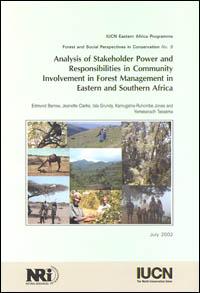Publicación
Analysis of stakeholder power and responsibilities in community involvement in forest management in eastern and southern Africa
Year:
2002
Abstract
The regions of Eastern and Southern Africa, embracing the countries of Sudan, Eritrea, Djibouti, Somalia(land), Ethiopia, Uganda, Kenya, Tanzania, Zambia, Malawi, Mozambique, Zimbabwe, Botswana, Namibia, Angola, Lesotho, Swaziland and South Africa display a great richness and diversity of cultures and peoples, geographical features and biodiversity. This complexity has created great diversity in resource use and management by rural people. The histories of these countries vary from a majority of former British colonies, under a variety of different governance regimes, to Ethiopia which was not colonized and has had a ancient recorded history complete with a highly organized monarchy and land based aristocracy. This review explores tree and forest conservation from the perspective of rural people and other key stakeholders who use those trees in different ways for a wide variety of reasons. A loose focus is placed on natural or indigenous trees. The purpose of this review is to identify and understand the key issues relating to power and the responsible involvement of communities in forest management activities, in order to learn lessons from practice, and inform and influence the policy arena. In turn, this will explore opportunities as to how forest options can contribute to the reduction of poverty, and identify important areas needing further research.


